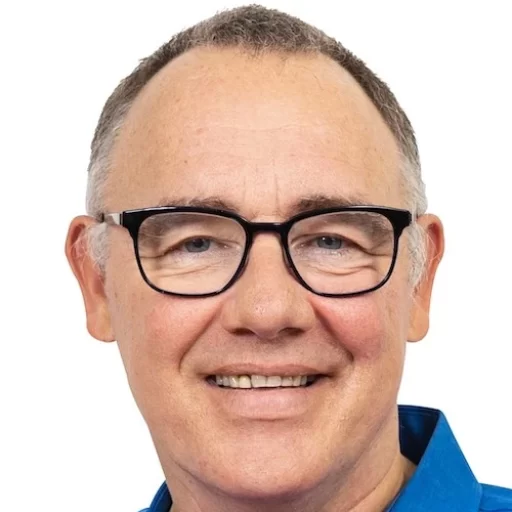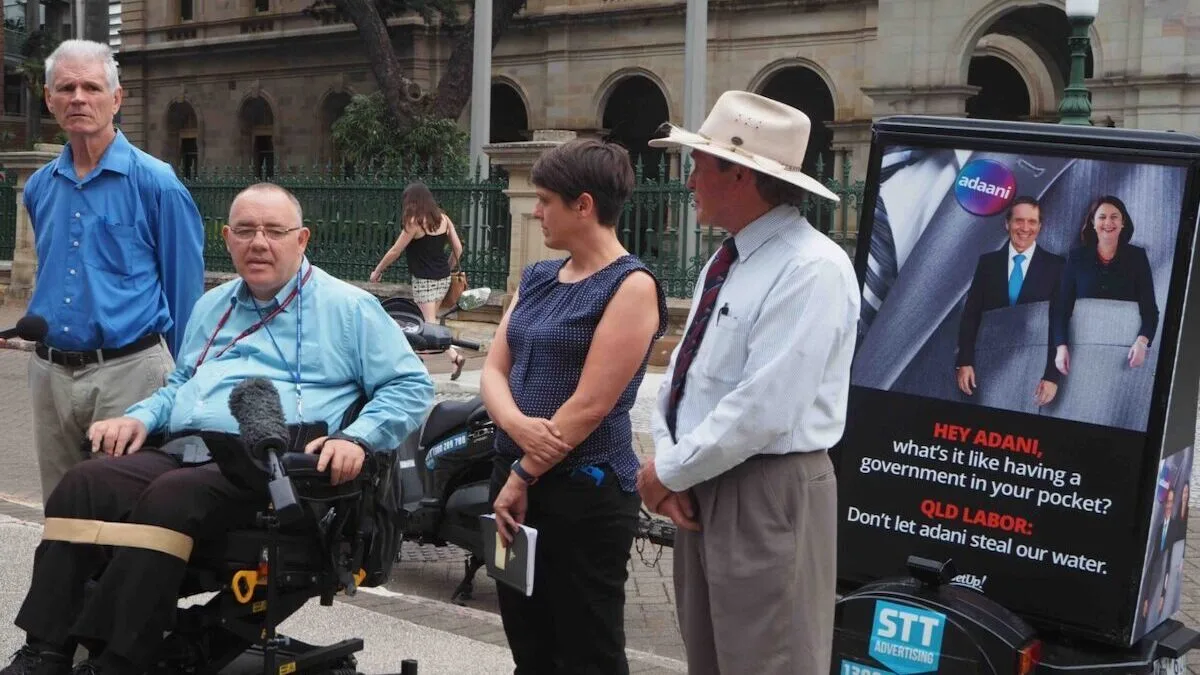Table of contents
End the Era of Fossil Fuels
Fighting fossil fuel had become one of my obsessions. From around 2000 onwards, climate change and the fossil fuel industry became central concerns of mine. During my time at JCU senior academics such as Dr. Jonathan Nott and Dr. Steve Turton were publicly discussing the threat of climate change in quite worrying terms. They were accomplished scientists who new their stuff. Consequently, I could also see climate change was the biggest threat to the future of humanity.
Tim Flannery was raising the issue of climate change nationally, and David Suzuki was one of many significant public intellectuals speaking out on the international stage. Suzuki’s concerns regarding environmental destruction and of the need to confront climate change resonated with many people. It was clear to any educated, thinking person, that climate change posed a clear and present threat to humanity.
Science told us the dangers
In 2008 Cairns Regional Councillors received a presentation on the climate crisis. We were warned about the impact climate change would have on our region. Temperatures were predicted to increase by over 1.5 degrees.
We would experience sea-level rise which would inundate much low-lying coastal land (especially when there were storm surges). There would be fewer cyclones, but those that did occur would be of greater intensity, causing massive damage.
It never occurred to me that refusing to accept advice from a climate scientist was an option. If a bridge needs to be built, you engage an engineer, you don’t design it yourself. I accepted the informed scientific advice of the technical experts.
Australia Backward on Climate
The scientific analysis I received in 2008 would prove true over the coming years. However, we were beginning a period in Australian politics where the ‘truth’ and ‘facts’ would become subject to political debate. A situation made worse as emerging social media fanned the flames of misinformation and conspiracy theory.
For over a decade, precious time was lost as politicians sought to make political mileage at our collective cost. Hence my frustration with climate change denial. This frustration was shared by activists and intellectuals around the globe.
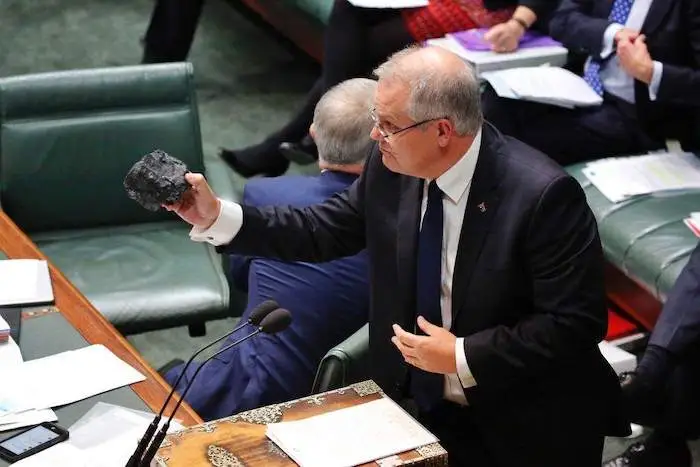
Fighting Fossil Fuel Climate Change
Campaigning for climate action became an ongoing passion of mine. In Parliament, I had a greater opportunity to give voice to the greatest challenge facing humanity. During my time in Queensland politics I championed the movement away from fossil fuels to renewable sources of energy. I fought hard against Big Coal and Coal Seam Gas (CSG).
In my first speech to Parliament, I said, “Climate change is a scientific fact. It is leading to sea-level rise and Cairns is a low-lying city. Every year I do my best to attend a king tide on the Cairns Esplanade. I see the esplanade seawall breached and water coming up through the storm-water drains and flooding underground car parks.
This is an urgent situation and we need a sense of urgency from all our elected leaders. I have the utmost respect for those working in disaster recovery, but the reality is that a summer king tide combined with a category 5 cyclone would see much of Cairns city destroyed. All levels of government need to first acknowledge the problem and then make sure our best scientific minds feed into an all-of-government policy response. I pray this will happen.”
The Adani Coal Mine
I strongly opposed the proposed Adani Coal Mine. It was clear to me that we had to move away from burning coal for the sake of humanity. Fossil fuel use was heating up the planet!
Around this time I learned of the consequences of increased water temperatures on the Great Barrier Reef, most notably coral bleaching.
Fighting fossil fuel meant opposing the Adani mine, one of nine massive coal projects earmarked for the Galilee Basin. This basin is about the size of Victoria, and contains one of the world’s largest untapped deposits of thermal coal – the type used to make electricity.
The mine proposed by Adani was meant to be a keystone project for the Indian company’s so-called “pit-to-plug” strategy of owning coal mines to feed its power plants in India.
Adani also owned ports in India. Its founder, Gautam Adani, was the 10th richest Indian in 2018, worth $17 billion. His poor environmental record was widely known and reported. In 2016 Gautam Adani met with Premier Annastacia Palaszczuk in Townsville with a timeline for the project. I was appalled by Palaszczuk’s support for the project.
Parliament Supports Coal
Remarkably, I was the only MP to oppose Adani in the Queensland Parliament. However, it was then-Treasurer Scott Morrison’s speech in the Australian Parliament – in which he held up a piece of coal and mocked concerns of climate change – that motivated me to make a plea for the planet. I gave the following speech (penned by my comrade Zelda Grimshaw) on 15 June 2017, holding a piece of bleached coral.
Plea for Action on Coal to Save Reef
Great Barrier Reef, Coral Bleaching
Mr PYNE (Cairns—Ind) (1.06 am): This is coral—bleached coral! Be scared. Be afraid. It will not hurt you, but the global warming that killed it will. This bleached coral is the canary in the coalmine. This coral was once part of the Great Barrier Reef, a 10,000-year-old ecosystem, one of the natural wonders of this world. Tens of thousands of men and women who work in the electorates of those who sit in this house, such as the electorates of Barron River, Mulgrave and Cairns, rely on coral for their livelihoods.
This coral, that has sustained thriving tourism and fishing industries for decades – this World Heritage wilderness area that can be seen from space – is dying due to global warming. Thirty per cent of the Great Barrier Reef is dead. This is a national emergency—a climate emergency.
The problem is that those in this House have an ideological, pathological love of coal. There is no word for ‘coalaphilia’ officially but that is the malady that afflicts those in this House. We continue to suffer the impacts of global warming because of their pathological, ideological addiction to coal.
Australia a Laughingstock
I continued, Australia has become a pariah and a laughingstock internationally because of the ‘coalaphilia’ of our political elite. We are wasting these precious years of opportunity to mitigate global warming.
Many of those who sit in this House are taking big money from the fossil fuel industry while allowing our brightest hopes to fizzle out in the dark of 19th century technology. I am sick to death of hearing the mantra of ‘jobs and growth’ repeated ad infinitum in this House. This coal-loving, coral-hating mantra has taken us to the brink of ecological disaster. Unless we stop to question what sort of jobs, what sort of growth, this mantra will destroy the planet we inhabit.
The Great Barrier Reef mass bleaching events are symptoms of climate change. Supporting new coal at this juncture is tantamount to ecocide. Today the ‘coalaphiliacs’ in this House may pander to Gautam, Gina and Twiggy in return for support, but in 10 or 20 years, when their grandchildren ask, ‘What did you do to stop global warming?,’ they will have no answer.
Campaigning at Home
I issued a media release reminding Cairns residents that emissions from coal were contributing to coral bleaching. Further I asked residents to vote to protect the reef as an international wonder and a massive financial asset to our region. My own Adani meme went viral on social media.
I warned that emissions from Adani coal would accelerate the primary threat to the reef’s survival, climate change! In the release I said, “Our governments seem to refuse to acknowledge the reality of the situation. It’s a choice – it’s coal or it’s coral and we are going to have to pick, because we can’t have both.”
While much of the local community was slow to embrace the issue, even in 2016 many Cairns residents were prepared to act to prevent climate change and rally against Adani.
Around this time, we were contacted by the radio/television producer Nell Schofield in relation to a movie she was making, called “Guarding the Galilee”. I appeared for a brief interview, and a few months later we organised a screening in Cairns.
People Fighting Fossil Fuel
The Oakey Coal Action Alliance (OCAA), founded in 2007, fought plans by New Acland Coal (NAC) for a Stage 3 expansion of their coal mine west of Brisbane. OCAA and NAC became engaged in a legal and political battle. I was happy to support OCAA in the fight to stop Stage 3 of the mine going ahead.
Environmental Defenders Office (EDO) CEO Jo-Anne Bragg said, “To be clear, the re-opening of the case was at the request of New Acland Coal and not our client. During the previous 84 hearing days of the court case, evidence challenged various claims made by New Acland mine owners, New Hope, exposing:
- Farmers’ critical groundwater supplies were at risk.
- A high risk of the project exceeding air quality limits unless so-far unproven controls were in place.
- Complaints about coal dust and noise levels and requests for data have fallen effectively on deaf ears for the past decade, including more than 100 complaints to New Hope and 30 to the state environment department.”
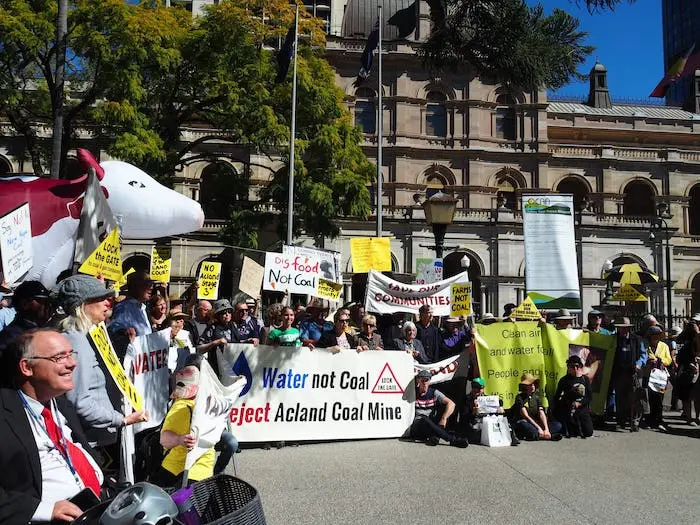
No Life Without Water
At the rally against the Acland expansion, local objector and OCAA representative Aileen Harrison made four points to the crowd:
- There is no life without water. Nothing can survive without water. Our farms cannot survive without water. We cannot survive without water. If the mine goes ahead it will cut through the aquifers and risk our bores drying up. If we have no farms, what will we eat? What will our children eat? We need to look after our future for our children and grandchildren. Long after the mine is gone, the farms will still be around.
- There are no certain alternatives to supply water. This risky mine should not proceed.
- What happens when mining is over in 12 years? Mining is short term, but if it destroys our water, it will kill off farming that could continue for hundreds of years. We need water for our food bowl now and in the future.
- The dust and noise from the mine affected my families’ health. If it is expanded, how many families will be affected, including children? How can anyone agree with the expansion?
Anti fossil fuel protesters
The more fossil fuels we use, the faster climate change takes place. This means sea levels rise faster. My electorate of Cairns is a low-lying city. It will be submerged! I would have been completely neglectful in my job if I had not voted against the coal industry and in favour of keeping our heads above water … literally.

Fighting Fossil Fuel – Black Lung Disease
Around this time a number of Queenslanders started getting sick with respiratory problems. The dreaded black lung disease had re-emerged in Queensland (it probably never really went away). I supported a resolution in the Queensland Parliament for a Royal Commission into the coal industry. The resolution was moved by the LNP, motivated by political opportunism, but it was opposed by the Qld ALP.
I could not believe the ALP would vote against a Royal Commission into a dirty industry which killed workers. Jo-Ann Miller, the Member for Bundamba and a coal miner’s daughter, broke-down during the debate as she spoke of her father dying from black lung disease. She was crying as she voted with the ALP to oppose the proposed Royal Commission.
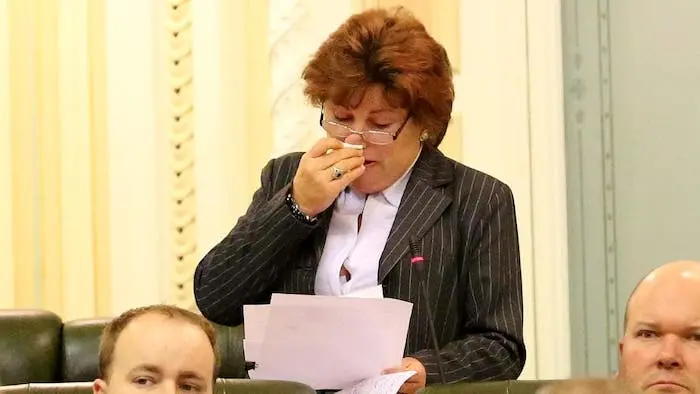
As always, I looked at the wording of the resolution and decided for myself what was the right way to vote. Voting for the resolution was what my conscience dictated.
A Parliamentary Report
To placate Miller and the CFMEU , the Palaszczuk Labor Government held an enquiry by a Parliamentary Committee (on which they controlled the numbers). It was a second best outcome, but Miller and the union knew I had their back, and that was most important to me.
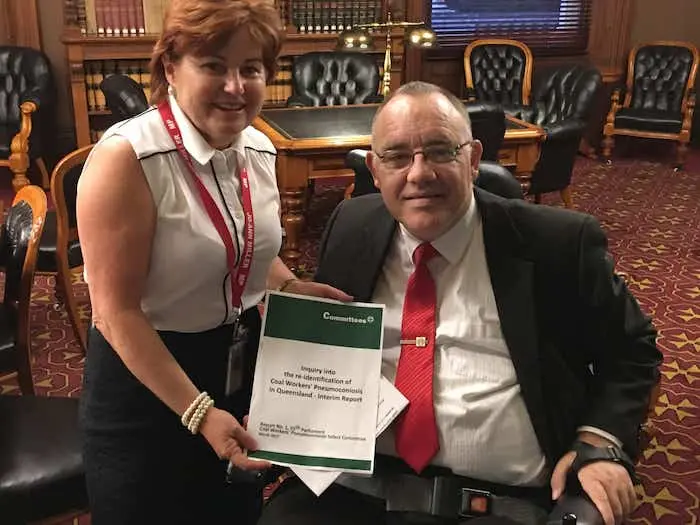
I was the only member of Parliament to question the whole narrative of ‘jobs, jobs, jobs’, which drove the political debate. I made the following comments in Parliament on 19 April 2016:
The thing I am about to say, you do not often hear in this place. That is, some jobs are simply not worth having—jobs that poison the air we breathe or jobs that will kill you. The Premier and the Leader of the Opposition are on a unity ticket in their support for the coal industry. I certainly am not.
Fighting Fossil Fuel and Fighting Adani
I continued to Parliament, I oppose the Adani Carmichael coal mine because of the environmental damage and the contribution to climate change. When I am talking to young people I explain it in terms of what smoking can do to the individual. You become dependent on tobacco, you keep smoking and it destroys your health.
What we are seeing with the consumption of coal and fossil fuel is a great contribution to greenhouse gases that is leading to more coral bleaching than we have ever experienced on the Great Barrier Reef and coral bleaching for the first time off the coast of Western Australia.
In light of what we are already experiencing, going further down the path of such a massive coalmine as Adani in my mind is just wrong. The other consequences are sea-level rise, which desperately affects low-lying cities like mine of Cairns, and more intense natural disasters such as we have seen in the Philippines and more recently in Fiji with cyclones and storms of biblical proportions. I did feel for my friend the member for Mount Coot-tha when he spoke in favour of Adani. If he had been Pinocchio, his nose would have crossed to the other side of the chamber. Because I know that he certainly does not want our state or our country to go down that path.
Fighting Fossil Fuel jobs as ‘jobs not worth having’
In terms of the individual, we have seen black lung disease re-emerge. In Queensland, since 1982 or 1983 we are supposed to have been applying international standards for reviewing X-rays for this disease. This has not happened. There have not been X-rays in line with international standards and there has been misreporting. Workers have been wrongly cleared to return to work when they have in fact been suffering from black lung disease. If these were mammograms or bowel screens that were being read by suitably qualified people there would be outrage overnight, yet mineworkers in mining jobs underground have been failed by the system that was supposed to protect them. They have had to fight for months and are currently being paid lip-service, not given solutions.
Some other jobs not worth having are some of the jobs in the coal seam gas industry, which is endangering our most valuable asset, our groundwater, and destroying valuable agricultural land. George Bender fought for these things, and many of us will carry on the fight that George Bender fought for himself and his community.
Coal Seam Gas (CSG)
Fighting fossil fuel includes fighting Coal Seam Gas (CSG). CSG mining is a risky, invasive form of unconventional gas mining. Indeed it usually involves thousands of gas wells, with roads, pipelines, compressor stations, wastewater dams, and other infrastructure. As a result, a CSG project can spread across hundreds of thousands of hectares of land. Additionally, the CSG industry often involves fracking (the fracturing of bedrock formations by a pressurised liquid).
There are numerous risks in proceeding with these invasive CSG fields. Consequences include air pollution, contamination or depletion of ground and surface water, pollution of waterways, health impacts on workers and nearby residents, and damage to biodiversity. Not to mention the encroachment on good farming land, disruption of other land uses and industries and the clearing of bushland.
Not long after becoming the Member for Cairns, I caught up with one of my old friends, Marybeth Gundrum. Marybeth was friends with a young woman by the name of Helen Bender. Helen’s dad, George Bender, had fought against the CSG industry in the Chinchilla district in western Queensland.
Sadly, after years of struggle and disappointment, George Bender tragically took his own life. Marybeth and Helen alerted me to the dangers of CSG and energised me to join the campaign against coal seam gas and fracking. It became an important part of my work fighting fossil fuel.
Anti Fossil Fuel Organisations
In 2015, I spoke with ALP State Secretary, Evan Moorhead, about my support for the Lock The Gate (LTG) Alliance. However, he replied, “Oh be careful with them, they are a bit radical.” I remember thinking, “FFS we are talking about farmers and the knitting nannas. They are not militant revolutionaries!”
LTG members were just ordinary people who did not want their family, or indeed their farmland, poisoned. By 2017, I had resigned from the ALP. This left me ostracised in the Queensland Parliament, with little chance of re-election. However, I was just so grateful for the opportunity to speak from the heart on issues I was passionate about. I said to Parliament on 22 March 2017:
Fighting Fossil Fuel and the Gas Crisis
Mr PYNE (Cairns—Ind) (6.12 pm): I speak in support of the motion moved by the Member for Mount Isa. I was surprised recently to read that we are in a gas crisis. After all, I regularly hear in this chamber how well our gas boom is being handled in this state, how effectively the government is managing it and how it is underwriting the economic vibrancy of Queensland and not to mention Gladstone, which from all accounts is turning into an economic industrial powerhouse the likes of which the world has never seen. How can there be a gas crisis when we are mining more gas than ever before?
About six years ago, the Queensland and Australian governments entered into agreements with three huge gas consortiums to give massive approvals to build three giant terminals in Gladstone. In addition, they promised huge supplies of gas in contracts with foreign countries, contracts nobody else has ever seen.
Mismanagement by Politicians
Our governments have, in effect, linked the local gas market to the international gas market. Consequently, it has massively pushed up the price for gas that people have to pay here in Australia. People are paying through the nose for something that occurs naturally here in vast quantities. In fact Australia is poised to become the world’s greatest gas exporter.
It reminds me of the line from The Rhyme of the Ancient Mariner, which goes something like ‘Water, water, everywhere, but not a drop to drink’. In this case it is more like ‘Gas, gas, everywhere, but none to keep Australian pensioners warm this winter’.
I am reminded of the lyrics from the Skyhooks song Ego Is Not A Dirty Word. I hope ‘ego’ is not a dirty word here, because there is a lot of ego in this chamber. Another word that should not be a dirty word is ‘regulation’. Regulation exists to protect consumers. We know that regulation works. We see it working in Western Australia. It is simply a matter of saying to these companies that if they want to export, they need to reserve 15 per cent for domestic use, for the domestic economy.
People are left scratching their heads about gas prices, but one thing they are not scratching their heads about is the growing evidence of the damage this industry has done in Queensland and New South Wales. They are damaging farms and damaging the environment.
Fighting Fossil Fuel: Call to Stop Fracking
We have seen farmers who have had livestock die. I have spoken to parents outside this chamber who live close to gas wells. They have said that their children are bleeding from the nose. So we have seen the tragic consequences here in Queensland: People like Mr George Bender, taking their own lives after lengthy struggle with this massive CSG industry.
When an individual farmer is dealing with a multinational company of such power, how can they compete with that influence? I have always believed that governments should be there to help the little guy. But, no, governments here in Queensland are helping the big multinationals, not the little guy.
We know that opening this country up to more damaging fracking will not help push down the price of gas. Because price is linked to the international market. Who is to blame for where we are today?
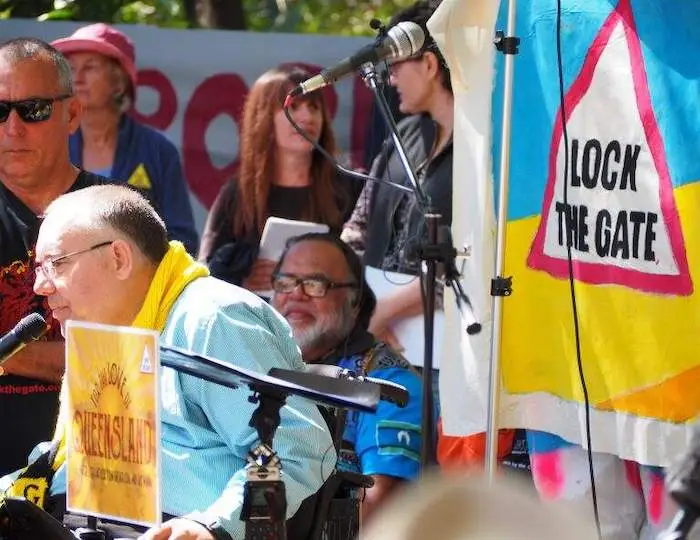
Government and Multinationals to blame
There were only two parties to blame for the gas crisis. One, the greedy multinationals that come here with no other goal than to maximise profits by selling to the highest international bidder, while sucking this nation dry. Secondly, the governments of this state and country that failed to reserve Australian gas for Australian consumers.
I did everything I could to campaign against expansion of the fossil fuel industry. It was also clear that my climate change activism was not winning me political support in my local community.
In Cairns, my political opponents in the major parties described me as being anti-development and captured by green ideology. However, I knew I had done the right thing by my city and by future generations. So I was proud that I had followed the science and ‘spoken truth to power’.
A majority in my electorate may not have supported my approach, but I was full of hope that future generations of political leaders would not fail the world as badly as my generation had on the existential issue of climate change.
All Chapters:
- Far North Queensland
- Growing up in Australia
- Aboriginal and Torres Strait Islander People
- Queensland Political Culture
- Princess Alexandra Hospital Spinal Unit
- People with Disabilities
- Cairns Regional Council
- Conservative Cairns Council
- ALP Qld
- Abortion Law Reform
- Fighting Fossil Fuel
- Local Government Corruption
- Losing to Labor
- My Cairns Council Return
- Council Mayors Silencing Dissent
- Socialist Alliance and Fighting Fascism
- Jenny Pyne and Life
- Cairns Council Lurches Right
- Farewell Comrades
